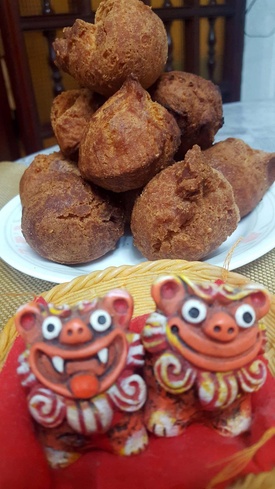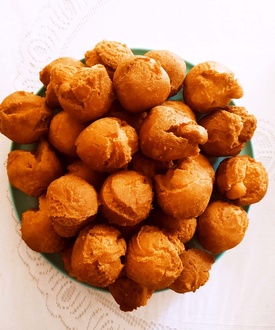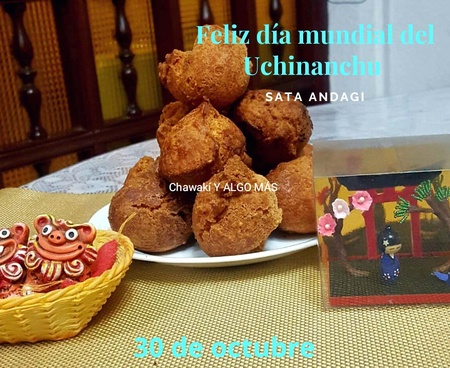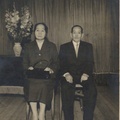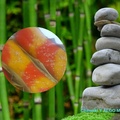I don't know when you came into my life, I just know that now you are part of it, of my culture, of my roots, of my memories, of being Nikkei, of something very important: “being Uchinanchu 1 ”.
When I see you, sometimes you are a flower, other times a woman who smiles at me, who makes me fall in love, or perhaps a pregnant mother who carries a treasure in her womb. They say that before you were only for the nobles, now you are so democratic that you are for everyone. Special guest in the happiest celebrations of our lives: like on a birthday, also when the groom is going to ask for his beloved's hand, reaching the kekkonshiki 2 , najiki 3 , tanka 4 . You are synonymous with good things coming, a must in the tushibi 5 , celebrating when it is our year, because that is what the obachan said 6 , you had to be there, at all our important events to celebrate. Some say that you came from China, it may be from Taiwan, I don't know, that doesn't matter, I just know that you left Okinawa to make everyone fall in love and give happiness.
You came from very distant lands, from the east, from the country of the rising sun, but not from the great island, rather from a smaller one, Uchina 7 . That's right, I say it with great pride, as if I were born in this country that our grandparents chose, crossing the entire blue of the Pacific Ocean to reach the country of the Incas. Ojí 8 and obá 9 brought you as chitu 10 those who went to the port to see them off or those who arrived at their house, who told them—to fill their bellies while traveling—that the road was long or perhaps to give them good fortune, like an amulet, in this search for a better tomorrow, to help the family that was left, with the promise of returning; an oath that could not be fulfilled because they fell in love with this place, from which they never wanted to leave again.
They came to this place where everyone said they were going to do okane 11 , a place so far away that in difficult times, they thought it was the end of the world. You left your paradise with a sun as radiant as a happy face, with sand as white as the purity and naivety of a couple of young people who were going to play adults in distant lands, who were walking along a beach the color of emeralds. , with moonlit nights so bright that sometimes they confused day with night, where they had the largest star observatory, just for them.
They arrived after a trip so long that it seemed like it would never end, on a ship that did not stop moving, that seemed to them to be traveling inside a typhoon. That trip took an eternity to reach a place so cold and dark with only shades of gray, which called for melancholy, even though they had just arrived; where the sun played hide and seek, the sky gray like its beach, with a night so dark that they missed the stars that they had previously enjoyed, always hopeful that a wonderful light would appear that would illuminate them, filling them with strength and enthusiasm. This was because they finally felt this land was theirs, their children, their grandchildren and all the remaining generations were born here. Many of the oji and oba did not return and when they left this world, they joined this land that welcomed them and loved until the end, although some were able to return, they understood that here was the place where they wanted to die.
They call you sata andagi, others andagi or maru 12 tempura, here they called you from bolita, fritter, bombita, Japanese doughnut, at home we call you sata tempura, sometimes round tempura. I remember you on birthdays, at your aunts' or the obachan's house, a must in all celebrations, with the sound of the three strings of the sanshin 13 , sometimes sad and melancholic, witnessing an odori 14 , or completely changing with great joy with the kachashi 15 where men and women went out to dance, no matter what, just feeling the joy of that moment that was engraved in their hearts. Although any reason was a good excuse to taste you, present in the tanomoshi 16 . At home, when visitors came, mom prepared them, without thinking that the sata anadagi were going to be like a lifesaver for us in the future, because of you we had to eat in difficult times, again showing that andagi nobility.
There is no ugly sata andagi, you are the most attractive thing at every party, all of them are delicious, some are very round as if made with molds; I prefer the imperfect ones, those that smile a lot, that burst when fried, they are the best, crispy on the outside and very soft on the inside, super delicious freshly made. They want to be present at all times of our lives, sometimes they change your shape and make you like sticks, that way you can be even in the suko 17 , they make you that way so that you don't smile, it wouldn't look good for you to do it on those occasions. You are so noble that, although the next day you are no longer crunchy, you are still soft inside and last many more days, that is why you came with Oji and Oba on their long trip “to fill your belly”, as they told you.
Each one has their own recipe to prepare it, like the one that mom made when she was 18 and that perhaps the oba taught her. Some add milk, others, orange, also those who add sesame or peanuts, they all have something special. Mom prepared them almost without following the recipe, adding something here and there, to achieve the texture she wanted. In my mind I can still see it: with my right hand I grabbed a portion, made a fist and what came out went straight to the pan to fry. With an ohashi 19 in the other hand, she was spinning it, although they were spinning alone in the bubbling oil, they were all happy, laughing like children in kindergarten, a party in the frying pan. My wife makes them the same way, but in other houses they form balls with both hands and then face the oil, where they still spin happily like a top.
In Okinawa everyone eats them, tourists fall in love with it, some prepare it at home, but now they can be found in many places. Visitors to Okinawa take it as a gift. There is white, blonde or brown sugar, chancaca, also matcha, they even add tofu, as for everyone.
Many of the oji and oba did not live long enough to be able to return to the small island where they were born, but some of their children and grandchildren were able to do so, including meeting other uchinanchu from around the world, gathering at the Uchinanchu Taikai festival. , to prove what they had been told and that it was not a story, that you could meet any uchinanchu in the world and you will always feel that familiarity, as if you had known them all your life, “ icaribachoode ” (we became brothers when we met) , which is magic and that sata andagi of the obachan, is the same one you found in Okinawa, with that synergy of all the experiences that each of us has had.
The sata andagi is the uchinanchu woman, she is my obachan, my mother, our aunts, our women; It is their sacrificed work, without rest in the business, to then continue working at home, their struggle, self-denial, their silence in words, but that they shout at us with their actions.
Arigatou sata andagi, arigatou uchinanchu woman.
This is my tribute to all Uchinanchu people who feel that we can speak different languages, have different nationalities, but that wherever we are in the world, we feel such familiarity that we feel like brothers. The sata andagi is a symbol for me, it is the uchinanchu woman who always goes forward and smiles at life despite all the difficulties.
Grades:
1. Uchinanchu. Originally from Okinawa, Okinawan.
2. Kekkonshiki . In Japanese, marriage.
3. Najiki . In uchinaguchi, a newborn ceremony, the name and date are placed on a red piece of paper and posted on the wall.
4. Tanka . In Uchinaguchi, tankaa-uuwee, birthday party for the first year of age.
5. Tushibi . In Uchinaguchi, a traditional birthday based on the Chinese twelve animal calendar, is celebrated every twelve years.
6. Obachan . Japanese term used to address elderly women, granny.
7. Uchina. Uchinaguchi, native name of Okinawa.
8. Oji . How we call grandpa.
9. Oba . How we call grandma.
10. Chitu . In uchinaguchi, gift, present.
11. Okane . Japanese, money.
12. Maru . Uchinaguchi, round.
13. Sanshin. Uchinaguchi, three-stringed musical instrument composed of a rounded body, covered with snake skin and a long neck.
14. Odori . Japanese, dance.
15. Kachashi . Uchinaguchi, a variety of music and dance accompanied by sanshin that is characterized by a very fast and dissonant rhythm.
16. Tanomoshi . System that was established for help, like the boards or tambourines in Peru.
17. Suko . Uchinaguchi, ritual for veneration of the dead.
18. Roberto Oshiro Teruya, “ Sata andagi, como mi mama's...none ,” (Discover the Nikkei, June 28, 2017)
19. Ohashi . Japanese, chopsticks used for eating.
© 2021 Roberto Oshiro Teruya


